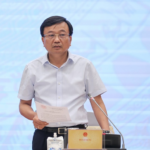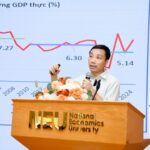After years of serving as a “key driver” for growth, job creation, and budget contributions, the private sector is expected to emerge as one of the solid pillars of the economy. However, on this journey, many private enterprises (DNs) still face institutional, legal, and resource access barriers, as well as a fear of criminalization in their business operations.
Overcoming Obstacles
Sai Gon 5 Real Estate Development Joint Stock Company recently called for help due to administrative procedure complications that have stalled their Binh Dang commercial service and apartment project in District 8, Ho Chi Minh City. The company has invested approximately VND 260 billion in the foundation and related works and has borrowed from banks. Currently, the company pays over VND 1 billion in interest to the bank each month, and more than 50% of their personnel have left. The banks have notified that if the project remains stagnant and the company’s financial situation does not improve, the project is at high risk of becoming non-performing.

Enterprises are eager for Resolution 68 to be strongly implemented to break through obstacles. Photo: HOANG TRIEU
Mr. Dang Anh Tu, the company’s CEO, stated that the main obstacle lies in the company’s name change from a 100% state-owned enterprise to a joint-stock company, which halted the project in 2019. The Ho Chi Minh City leadership has since provided decisive directives, and the update of the new legal entity name has been completed. However, a new obstacle arose as the Department of Construction required an update to the 1/2000 planning from the People’s Committee of District 8 and requested contact with the Department of Planning and Investment (now the Department of Finance) to adjust the progress in the investment approval decision due to the project’s six-year delay.
In late 2024, Vice Chairman of the Ho Chi Minh City People’s Committee, Bui Xuan Cuong, consecutively issued directives, but over seven months later, the project’s obstacles remain unresolved. Recently, after the company’s plea for help, Vice Chairman Bui Xuan Cuong again criticized the Departments of Construction and Finance and demanded an urgent resolution, with a report to be submitted to the People’s Committee of Ho Chi Minh City before June 10th. “There are directives from above, but the executors below are not taking action. The Prime Minister also recently stated that a clear and quick response is needed so that enterprises are aware and not let down by reasons that are not worth such a significant loss to the state,” shared Mr. Tu.
Regarding administrative procedures, Mr. Truong Sy Ba, Chairman of Tan Long Group, shared that the company aims to increase its pig herd to 10 million by 2030. However, a prerequisite for this goal is more streamlined and expeditious administrative procedures. Currently, it takes about three years from land purchase to farm construction, which greatly hinders the company. As a result, the company has to buy back already-licensed projects at high costs, reducing its competitiveness. Additionally, according to regulations, projects with an expansion investment of over VND 3,000 billion must be reported to the National Competition Committee and wait for up to 90 days or more for approval. This bottleneck needs to be addressed.
Meanwhile, Mr. Vuong Quoc Toan, Chairman of Lan Hung Real Estate Group Joint Stock Company, shared that many small and medium-sized enterprises currently struggle to access land and capital and cannot lease land for production and business. While there are many industrial parks in the country, most only lease land from 1 hectare upwards, costing around VND 30 billion, which is beyond the reach of small enterprises that only need 1,000-3,000 square meters with a budget of VND 5-10 billion.
Mr. Toan suggested the effective implementation of Resolution 68 of the Politburo, which allows localities to use the budget to support the infrastructure of industrial parks, industrial clusters, and incubators. Developers should allocate suitable land for small, high-tech, and startup enterprises, with well-planned infrastructure, including fire protection, the environment, etc., to facilitate their development.
Tax-related Challenges
In addition to administrative issues, Mr. Truong Sy Ba also shared that his group was the first enterprise to bring Vietnamese rice to the Japanese market under the AAN brand instead of a foreign brand. In 2024, the company exported 5,000 tons of branded rice to Japan, and this year’s plan aims for a record 30,000 tons.
To achieve this goal, the company had to heavily invest in modern technology for preservation, production, and processing to reduce post-harvest losses. To invest in modern technology that meets standards, the company needs more accessible and flexible capital, but interest rates still fluctuate between 8% and 10%, which is a significant challenge. As the profit margin in agriculture is not high, Mr. Ba proposed preferential interest rates for the agricultural sector, especially for units investing in infrastructure, processing, and post-harvest preservation.
Mr. Hoang Van Thuy, CEO of Dai Hoang Thuy Joint Stock Company (Ho Chi Minh City), a coffee specialist, frankly shared that private enterprises still face difficulties despite the state’s efforts to reform institutions and create a favorable investment and business environment.
According to Mr. Thuy, administrative procedures remain cumbersome and even more time-consuming than before. Specifically, it now takes 2-3 weeks for a company to complete the paperwork to purchase a new car, whereas it only took about three days in the past. Previously, enterprises often received inspections from various delegations, which later reduced to one delegation per year, but this practice only lasted for 1-2 years. Currently, enterprises still have to host numerous delegations, including economic police, environmental police, market management, food safety, etc. Sometimes, inspections are conducted without prior notice, creating uncertainty for businesses.
A significant challenge is that enterprises cannot directly purchase agricultural products from farmers because they do not have invoices. As a result, enterprises have to buy through intermediaries, which increases costs and harms the enterprises. “In the past, farmers only needed to make a declaration of the time and quantity of sales. Now, according to regulations, they must issue invoices, which most farmers cannot do,” said Mr. Thuy.
Mr. Thuy also shared that private enterprises are like “walking on a tightrope,” especially regarding tax-related issues, which can easily lead to violations and potential criminal prosecution. There are too many related laws for enterprises to fully understand, and the regulations are sometimes overlapping, making it easy to “violate without knowing.”
The question arises as to how to reduce the prosecution of enterprises. When an enterprise violates the law, there are many consequences: laborers are affected, and banks and customers are also implicated. Therefore, Mr. Thuy proposed that in cases of minor violations, enterprises should be reminded or administratively fined to allow them to rectify and for the state to still collect taxes.
Echoing the enterprises’ aspirations, Dr. Do Thien Anh Tuan from the Fulbright School of Public Policy and Management pointed out a particularly important issue emphasized in Resolution 68: the need to soon institutionalize the view of “not criminalizing economic and civil relations.” The abuse of criminal measures in handling economic relations has caused anxiety and insecurity for enterprises and entrepreneurs, hindering their innovation and development.
“It is necessary to quickly concretize the legal principle of focusing on prevention and remedying consequences, only applying criminal handling when there is sufficient clear evidence of criminal offenses. Do not let the abuse of criminal measures become a tool for administrative intervention or pressure on enterprises. This is essential for building a safe and transparent investment and business environment, encouraging enterprises to confidently develop and expand their scale, thereby contributing to the economy’s growth,” said Dr. Do Thien Anh Tuan.
Second Session of the Vietnam Economic Forum 2025
With the need for a substantive dialogue forum where policymakers, experts, and businesses can frankly discuss and propose breakthrough solutions, at 8:30 am today, June 5, NLD Newspaper organized the second discussion session of the Vietnam Economic Forum 2025 with the theme “Private Economy: Removing Barriers – Assigning Heavy Responsibilities.” The program took place at the hall on the 2nd floor of the NLD Newspaper in a direct and online format.
Support Must Come from Practical Resources
From an expert’s perspective, Dr. Nguyen Xuan Thanh, a senior lecturer at the Fulbright School of Public Policy and Management, emphasized that Vietnam urgently needs to re-stimulate growth, and the development of the private sector cannot merely stop at political messages but requires specific institutional breakthroughs. “The current bottleneck lies in implementation. Policy issuance is not enough; the crucial question is whether the policy creates a mechanism for enterprises to access resources fairly and efficiently,” said Dr. Nguyen Xuan Thanh.
According to Dr. Nguyen Xuan Thanh, policies should not just be slogans. Support must come from practical resources, avoiding the mechanism of “begging and giving” and absolutely not creating additional cumbersome supervisory apparatus.
The Art of Construction: Minister’s Vision for Streamlined Permits
The spokesperson from the Ministry of Construction asserted that their perspective is to facilitate and maximize opportunities for citizens and businesses alike.
The City of Ho Chi Minh Dreams of a Permit-less Construction Future
The Ho Chi Minh City Department of Construction has been tasked by the People’s Committee of Ho Chi Minh City to provide detailed guidance and issue documents regarding the new policy of eliminating construction permits. This initiative is set to be implemented as soon as possible, with the department aiming to release the necessary documents in June.
What GDP Growth Rate Does Vietnam Need to Attain to Surpass a Per Capita GDP of $28,500 and Join the High-Income Country Group by 2045?
On June 3, the National University of Economics in collaboration with the Central Policy and Strategy Committee organized a policy dialogue seminar on the topic: “Orientation and Solutions for High and Sustainable Economic Growth towards 2045”. At the seminar, experts discussed growth scenarios and solutions for Vietnam to achieve its economic development goals.
The Rainbow After the Storm: Top Brokers and Experts Predict VN-Index Hitting the 1,500 Mark
“Following the ‘tariff shock’, the VN-Index staged a remarkable recovery, prompting optimistic assessments from analysts. “





















